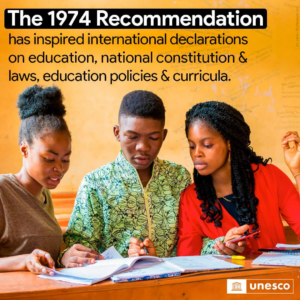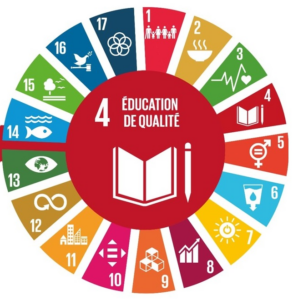Blog of Evelyne PARA, SI UN Representative at UNESCO.
In November 2023, UNESCO adopted a new Recommendation on Education for Peace, Human Rights and Sustainable Development. This Recommendation is unique in that it considers all aspects of education and links different areas, from digital technologies and climate change to gender issues and fundamental freedoms.
This global normative instrument, adopted by the 194 Member States of UNESCO at the close of their 42nd General Conference, replaces the “1974 Recommendation” which, almost 50 years ago, saw the Member States unite to make education an essential driver of peace and international understanding. Over the past two years, UNESCO has revised this visionary instrument so that it can respond to the greatest current challenges and future shocks.
As Representative of Soroptimist International at UNESCO, and observer designated by the UNESCO Education Commission to participate in certain work of Member States, I welcome the inclusive and participatory revision process which has created a climate of trust between the countries and allowed them to adopt this new text which is the product of a broad consensus.

Why did UNESCO revise the “1974 Recommendation” on Education?
New approaches to education were needed to address recent and long-standing issues and threats to human rights and international understanding.
The legal landscape has also transformed: the international community now has a more robust set of agreements and frameworks to promote peace and non-violence that did not exist in 1974. New research and new data have guided the formulation of effective policies and also the monitoring of their results. The revision of the 1974 Recommendation was inspired by the conclusions of the Summit on Educational Transformation and the report of the International Commission on The Futures of Education which highlighted the need for a more relevant and avant-garde vision of teaching, learning and innovation.
As recalled by Stéfania Giannini, UNESCO Assistant Director-General for Education, the revision of the Education Recommendation represents a unique opportunity to boost and update the global consensus on the role of education – in all its forms – to prepare learners of all ages, and future generations, to face future shocks and shape a more just, sustainable, healthy and peaceful future.

What are the key elements of the revised Recommendation?
- New concept of peace
Peace presupposes not only the absence of war or direct violence, but also the existence of a positive and participatory process allowing individuals and communities to act together on a daily basis in order to build just, inclusive, sustainable societies, peaceful and focused on health promotion.
- Climate change and Environmental sustainability
Destruction of schools, worsening poverty, increase in school dropouts and population displacements: the catastrophic effects of climate change are no longer isolated emergency situations. They have negative repercussions on the right to education of people around the world.
Education systems must effectively improve their resilience to climate crises and overcome their consequences. Furthermore, for learners of all ages to realise their potential and build a peaceful future, they must understand the fragility of the planet and the increasing interdependence between societies, natural resources and ecosystems.

- Gender Equality
Women still represent nearly two-thirds of adults who cannot read. As for girls, they are often unable to fully enjoy their right to education, whether it is to pursue studies, complete them or benefit from them. Although considerable progress has been made in recent decades, significant gaps remain between men and women, including poverty, geographic isolation, early marriage and pregnancy, violence based on gender as well as traditional mentalities fixing the status and role of women and men.
The promotion of gender equality and the recognition of its importance in realising the right to education for all is one of the principles guidelines of the Recommendation, which reflects the overall priority of UNESCO.
- Global Citizenship Education
As pressing national and global issues transcend borders, the role of education goes beyond learning to read, write and do numeracy. It is increasingly about seeing interdependent relationships on a global scale and understanding the impact of our choices and actions on people and communities at local, national and global levels.
This is why knowledge, skills, values and attitudes that advance tolerance, respect and a sense of common humanity – components of global citizenship education – find their place in the revised Recommendation. This may include teaching and learning about the consequences of past and current events and conflicts, studying economic, social and political relationships between countries and societies and encouraging empathy and respect for the diversity of cultures and opinions.
- Media and information literacy skills
In an age where information is characterised by its abundance, diversity and accessibility, media and information literacy skills and digital skills represent essential tools for survival and thriving teachers and learners.
Critical thinking, empathy and understanding of principles of digital security, respect for privacy and ethical online interactions are particularly highlighted in the updated text. The proposed revisions to the 1974 Recommendation take into account the challenges posed by the digital landscape, such as disinformation and hate speech, as well as the teaching and learning opportunities offered by new technologies.
- Lifelong learning
By adopting a lifelong learning approach, the revised Recommendation ensures that education remains relevant and accessible at different stages of life and at different levels. Links are encouraged between early childhood education and adult education, formal education and technical and vocational training. Thus, everyone can acquire new skills, return to studies or start from scratch in order to realise their dreams and make a valuable contribution to society.
- Non-formal and informal education
Schools do not operate in isolation. The classroom is just one of many spaces where children socialise themselves and learn. The Recommendation builds a bridge between formal, informal and non-formal education and underlines the importance of an approach mobilising the whole of society in the service of learners. Parents, extracurricular activity leaders, sports, cultural and local associations, museums, media and civil society: all are essential partners in education. This sphere may be of particular importance for out-of-school learners.
Conclusion
“Today, while crises polarise our societies, while the multipolar world order continues to be the scene of violent conflicts, more than ever education must be a bulwark against the fractures of the world and the foundation of lasting peace”, declared Audrey Azoulay, Director-General of UNESCO, when approving this revised Recommendation.
By helping to build more peaceful, just, egalitarian, equitable, inclusive, democratic, healthy and sustainable societies, the new Education 2023 Recommendation will constitute a tool for all education stakeholders to achieve the Sustainable Development Goals, and in particular the Education Goal SDG4.

